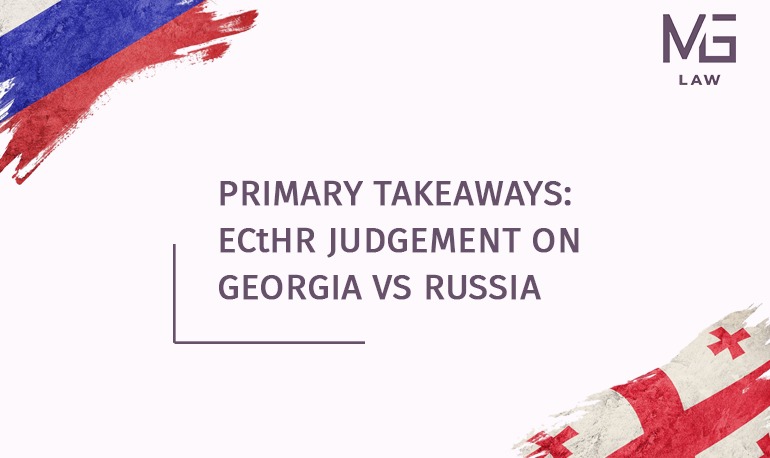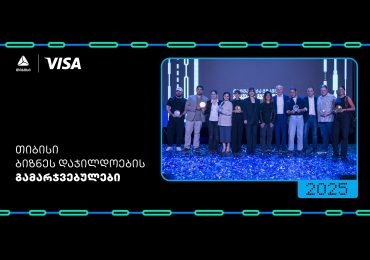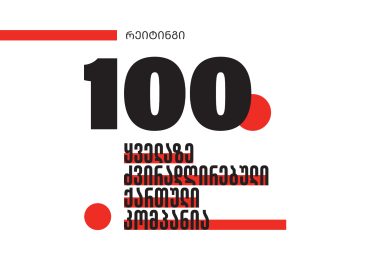The present note was prepared by law firm MG Law Office to summarize primary takeaways of the Judgement of the European Court of Human Rights on Georgia v. Russia (II).
On 21 January 2021, European Court of Human Rights (ECtHR or the Court) has delivered a judgement on a long-awaited case between Georgia and Russia. Case pertained to the violation of the Human Rights during and in the aftermath of 2008 Georgia-Russian War (Georgia v. Russia (II)).
The said case is not the first inter-state proceeding that Georgia has brought against the Russian Federation (Russia), namely:
- On 26 March 2007 Georgia has lodged an official complaint against Russia in ECtHR on the questions pertaining to the deportation of the citizens of Georgia from Russia. The Court has ruled in favor of Georgia and Russia was subject to the payment of damages in the amount of EUR 10 million.
- On 12 August 2008, Georgia has filed before the International Court of Justice (ICJ) an Application against Russia based on the Convention on the Elimination of All Forms of Racial Discrimination (CERD) on the grounds of the ethnic cleansing committed by Russia on the Georgian territory in the years of 1999-2008. Proceedings were halted due to non-exhaustion of bilateral negotiations, a prerequisite to initiating a case based on the CERD. According to the ruling of the ICJ, case can be resumed after talks with Russia are concluded, if the latter does not acknowledge its responsibility for ethnic cleansing.
- International Criminal Court (ICC) is currently conducting an ongoing investigation of the 2008 Georgia-Russian War on the possible war crimes and crimes against humanity that have been committed by parties to the conflict in the Tskhinvali Region, Georgia. Investigation has been launched in 2016.
In parallel, there have been numerous individual cases brought against Russia by the citizens of Georgia before ECtHR for human rights violations in the course of 2008 Georgia-Russian War and on-going occupation of Georgian territories.
Prior to discussing decisions and the principal aspects of the Georgia v. Russia (II) case, it is important to emphasize that contrary to a popular belief, ECtHR’s judgement does not discuss the question on who initiated the war and does not relate to the aspects predating 7 August 2008.
ECtHR Judgement
ECtHR found Russia responsible for (i) procedural aspect of right to life (Article 2) – neglecting to investigate events that have occurred during both the conduct of hostilities (8 August – 12 August) and its aftermath (12 August – 10 October 2007); (ii) torture of Prisoners of War (Article 3); (iii) arbitrary detentions (Article 5); (iv) right to family life (Article 8); (v) looting of property (Article 1 of the Protocol No. 1) and (vi) freedom of movement of internally displaced persons (Article 2 of the Protocol No. 4).
Two phases of the hostilities
Court has selected to divide its deliberations of the Georgia-Russian War into two separate phases, the phase of 8 – 12 August 2008 or the active phases of the hostilities and its aftermath, i.e., the phase of occupation.
Generally, responsibility for violating the rights enshrined in the Convention can fall on the contracting party only if it is regarded that the State has held an effective control over the territory (spatial model) or over a victim by a State agent (personal model) and thus should have been able to preclude the violation of particular rights.
In this regard, the Court stated that due to the events that have occurred during the active phase of hostilities, i.e., the chaos surrounding confrontation and fighting, it was difficult to speak of the effective control of an area. Therefore, the Court considered that it lacked jurisdiction with respect to allegations regarding violation of right to life caused by artillery and shelling. However, the Court did not refrain from delegating responsibility on Russia during the active phase of hostilities in the case of the detainment and the ill-treatment of the persons in the Tskhinvali Region, Georgia, as well as for the failure of Russia to conduct an effective investigation of the violation of rights.
ECtHR has been clear on concluding an existence of an effective control of the territory of Georgia (Abkhazia and Tskhinvali Region) and its ongoing occupation by Russia from 12 August 2008, which in turn provided for the ground to conclude that responsibility for the violation of the individual rights falls on Russia.
Primary takeaways
Primary win of Georgia in the particular case can be best explained in the lenses of an acknowledgment of the so-called Administrative Practice of Russia in the violation of Articles 2, 3, 8 of the Convention. Administrative Practice as explained by the Court itself refers to the “the repetition of acts” – the continuous and an ongoing violation of the particular rights, and “official tolerance” by a State, i.e., an acknowledgment and a wilful ignorance of the violation of rights by the Russian authorities.
Most importantly, current case is the first official legal analysis of its kind that confirms the continuous occupation of the Georgian territories by Russia as well as recognizes Russia’s obligation to allow the return of the 23,000 forcibly displaced ethnic Georgians as a result of 2008 Georgia-Russian War.
Confusion surrounding material effects of the judgement has been predominant. Even though the Court is yet to deliberate on the monetary compensation to the victims of the Georgia-Russian War, and EUR 10 million compensation following the Georgia v. Russia (I) judgement is yet to be paid, the effect of the current judgement is incalculable in terms of its political and legal value.
















